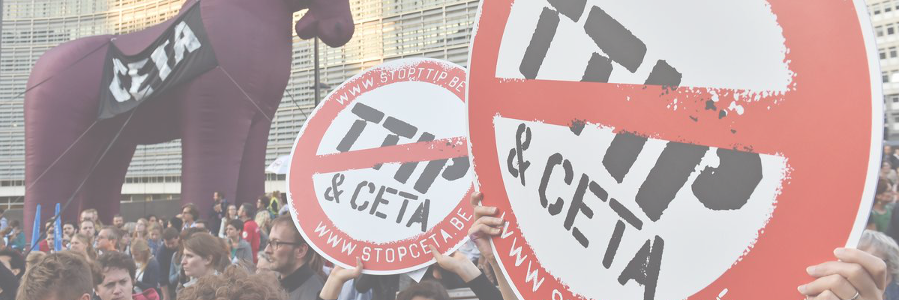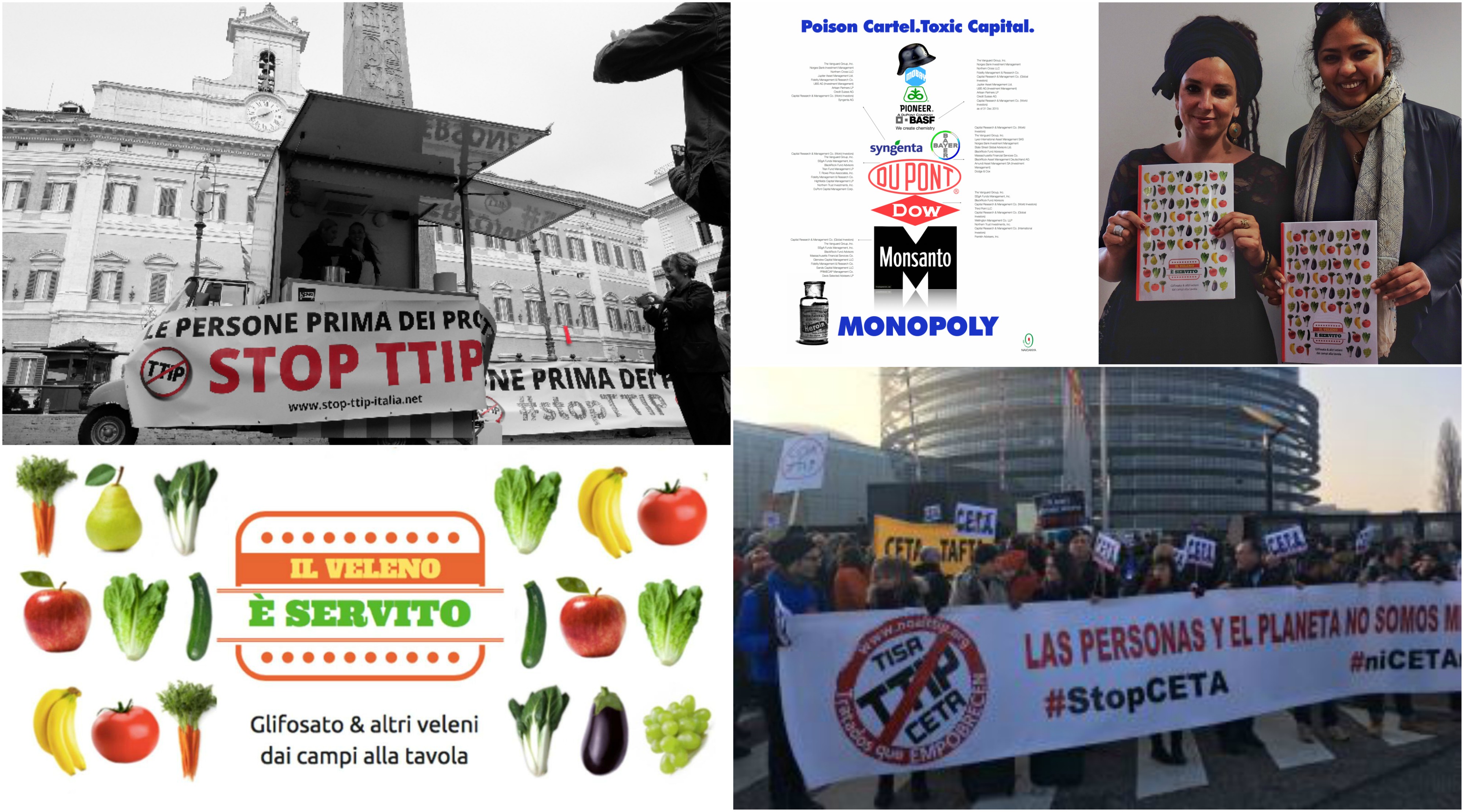
The recent visit of Canadian President Justin Trudeau to Europe is important not only for europeans and canadians but also for americans.
And this is for one simple reason: the vote by the European Commission on February 15th in favour of CETA (Comprehensive Economic and Trade Agreement between Europe and Canada). The final ratification by the EU member states though is still pending and the “Stop TTIP Italia” campaign was mobilized to protest against this agreement defined as “toxic”. But what has TTIP to do with CETA and why are these trade agreements considered toxic concern Americans too?
With its secretive negotiations format, CETA is going to affect not only tariff barriers, but also non-tariff barriers, that is all environmental, social, food standard regulations which distinguish the European market from the overseas market. The approval of these treaties would mean risking the triggering of a “downward harmonization” of standards, calling into question the high European standards of environmental and animal health protection, public health, food safety and consumer information. Moreover CETA would open the door to some 42 thousand Canadian affiliated American firms, which in this way would no longer need the TTIP scrapped for now by Trump. These free trade agreements are strongly supported by corporations, the main aim of which is to sell to the world their industrial system of agriculture, based on GMOs, intensive monocultures as well as heavy herbicides and pesticides use. Across the world civil society movements are mobilising against the use of agrotoxics promoted by the corporate Poison Cartel (Bayer CropScience, Monsanto, Basf, Syngenta, ChemChina, Dow AgroSciences and DuPont), which is making huge profits to the detriment of citizens and at the expense of nation states. This is why we define CETA as a Agro-Toxic Agreement.
The recent report “Poison is served”, prepared by Navdanya International and A Sud, analyzes the real risks related to pesticide use in agriculture and exposes the agrochemical lobbyists’ intense pressure on governments and institutions aimed at keeping glyphosate based products on the market, in spite of their potential toxicity and related risks for the health of citizens and the environment. It also outlines the weaknesses of the overall regulatory system which should protect citizens and consumers from the voracious appetites of corporations. Moreover the report shows how a sustainable, fair and healthy food system is possible as opposed to an unfair, unsustainable and toxic industrial system. This view is also claimed by the recent Report of the Special Rapporteur for the Right to Food of the UN, Hilal Elver, who debunks the myth that pesticides are necessary to feed the world as well as denounces the dangers of long term exposure to agrotoxics for workers and consumers.

It is in this context that the importance of Canada’s role must be framed. The attention of european public opinion on the use of agrotoxics in agriculture is growing, also because of the recent protests around the huge amount of Canadian wheat imported in the country, which is extensively used by Italian pasta manufacturers, for instance, because of its low price and high protein content. The cultivation of wheat in Canada requires the use of a massive amount of glyphosate based herbicides, which are also used for drying the wheat before harvest, as local temperatures do not allow for natural drying. As a result, we have more protein in our plates, but also more poison. The import of Canadian wheat is also going to affect small and medium size companies and small producers. As the report points out, the area of wheat cultivated land in Italy has shrunk by 30% in the last 15 years. In April 2017 the Canadian Food Inspection Agency published the data of glyphosate contamination in food. Traces of the herbicide have been detected in fresh vegetables (7,3%) as well as in processed food (12,1%). What is alarming is the presence of glyphosate in 36,6% of analyzed wheat samples, of which 3,9% exceeds the 5ppm maximum limit allowed in Canada.
Indeed, when in 2015 The International Agency for Research on Cancer (IARC), the specialized cancer agency of the World Health Organization, classified glyphosate as “probably carcinogenic to humans” (Group 2A), a global debate emerged with regard to the brittleness and ineffectiveness of European policies on pesticides. For this reason the European Commission charged the European Food Safety Authorization with the review of the pesticide risk assessment of the active substance glyphosate, which in the end was declared “unlikely to pose a carcinogenic hazard to humans”. After two years, on 15th of March 2017, the European Chemical Agency also classified Glyphosate not a carcinogen. Both the declarations of the European agency on glyphosate have been deeply criticized by independent scientists and international organizations denouncing the lack of transparency and conflicts of interest within the risk assessment evaluations. For this reason, an open letter was sent from the French toxicologist Dr. Christopher J.Portier to the President of the EC Juncker, requesting a review of the Glyphosate evaluation by ECHA, EFSA, given that “the raw data for the animal cancer studies for glyphosate have been released, and analysis of these data show eight instances where significant increases in tumor response following glyphosate exposure were not included in the assessment by either EFSA or ECHA” suggesting that these evaluation are scientifically flawed.
As the report “Poison is served” underlines, if we are able to look beyond corporate myths and propaganda, we will understand that there is enough knowledge, science and real examples in sustainable and ecological food systems, to declare that we do not need any agro-toxic product to grow our food. It is essential to expose the lack of pesticides regulation in international law. It is our duty to make our voice heard by the authorities in charge, for them to start protecting us more from the results of the influence of agrichemical corporations, both at the scientific and at the institutional level. How much longer will people be able to withstand a system which keeps making still richer a few private and institutional entities, while causing irreversible damage to their health and environment?
Ruchi Shroff – Navdanya International
Also read
Written ‘CETA’ – Spelled ‘TTIP’
By Manlio Masucci, 10 November 2016
